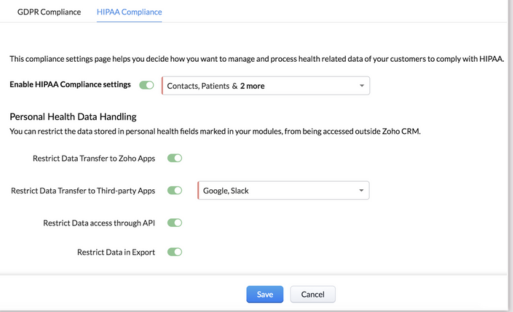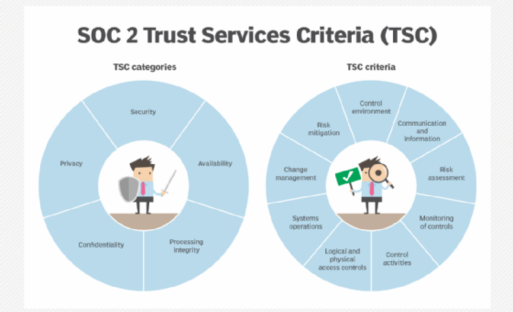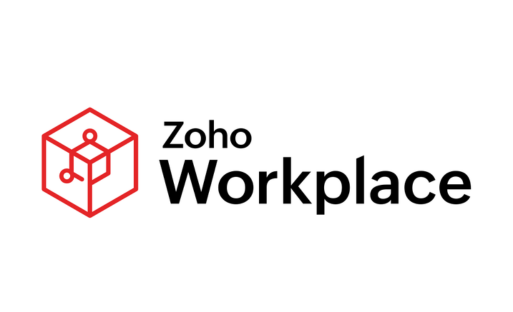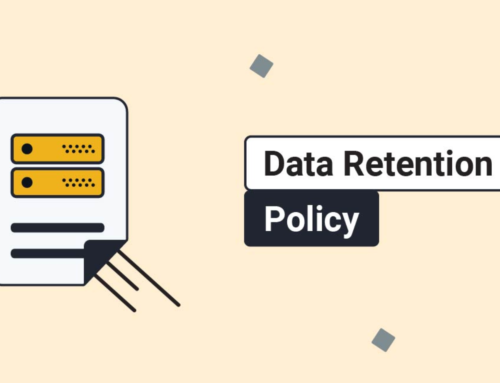Introduction to Zoho Workplace Compliance and Data Protection:
In today’s rapidly evolving digital landscape, the importance of workplace compliance and data protection cannot be overstated. As businesses increasingly rely on cloud-based solutions for collaboration, communication, and productivity, ensuring the security and compliance of the tools they use is paramount. Zoho Workplace, a comprehensive suite of cloud-based applications, has emerged as a popular choice for businesses seeking a seamless and integrated solution.
Zoho Workplace Overview
Zoho Workplace stands out as an integrated suite of productivity and collaboration applications, strategically designed to enhance and simplify business operations. The suite comprises various tools, including Zoho Mail, Zoho Docs, Zoho Sheets, and Zoho Show, among others. Each of these applications serves a specific purpose, contributing to a comprehensive ecosystem that facilitates seamless workflow and communication within an organization.
One of the defining features of Zoho Workplace is its cloud-based architecture. By hosting the applications on the cloud, Zoho provides users with unparalleled flexibility. This means that employees can access their work and collaborate with team members from virtually anywhere and at any time. The cloud-based infrastructure not only fosters remote work but also ensures real-time synchronization, allowing for efficient and smooth collaboration among team members, regardless of their physical locations.
As businesses increasingly integrate Zoho Workplace into their day-to-day operations, it becomes imperative to delve into the platform’s approach to compliance and data protection. In the modern landscape of data privacy and security concerns, organizations need assurance that their sensitive information is handled with the utmost care and in compliance with industry regulations. Zoho Workplace recognizes this need and emphasizes a robust approach to compliance, ensuring that businesses can trust the platform with their critical data.
The suite’s commitment to data protection extends beyond mere compliance, encompassing measures that prioritize the security and privacy of user information. This includes encryption protocols, secure authentication processes, and regular security updates to mitigate potential vulnerabilities. By adopting these proactive security measures, Zoho Workplace aims to provide a reliable and secure environment for businesses to conduct their operations without compromising on data integrity and confidentiality.
Zoho Workplace is not just a collection of productivity tools; it’s a comprehensive solution that addresses the evolving needs of modern businesses. Through its cloud-based architecture and commitment to compliance and data protection, Zoho Workplace empowers organizations to navigate the challenges of the digital era with confidence, ensuring a secure and efficient collaborative environment for teams to thrive.
Compliance Standards at Zoho Workplace
Zoho Workplace places a strong emphasis on adhering to various compliance standards to guarantee the secure and compliant handling of user data. These standards serve as a testament to Zoho Workplace’s commitment to safeguarding user information and ensuring that their platform aligns with global regulatory requirements.
GDPR (General Data Protection Regulation):
One of the cornerstone compliance standards embraced by Zoho Workplace is the General Data Protection Regulation (GDPR). This European Union regulation governs the processing of personal data belonging to EU citizens. Zoho Workplace’s design incorporates key GDPR provisions such as data encryption, user consent mechanisms, and the right to erasure. This ensures that users’ personal information is treated with the highest level of privacy and security.
HIPAA (Health Insurance Portability and Accountability Act):
Recognizing the critical importance of healthcare data, Zoho Workplace caters to businesses operating in the healthcare sector by providing features that align with the Health Insurance Portability and Accountability Act (HIPAA). Zoho Workplace’s commitment to compliance with HIPAA regulations is evident through the implementation of robust security measures tailored to protect sensitive health information, thereby instilling confidence in users within the healthcare industry.
SOC 2 (Service Organization Control 2):
In addressing the needs of businesses dealing with sensitive customer data, Zoho Workplace places a strong focus on Service Organization Control 2 (SOC 2) compliance. Regular audits are conducted to demonstrate Zoho Workplace’s dedication to upholding the security, availability, and confidentiality of user data. By adhering to SOC 2 standards, Zoho Workplace reassures its users that their data is managed with the highest level of scrutiny and protection.
ISO 27001:
To further underscore its commitment to international standards for information security management systems, Zoho Workplace has obtained ISO 27001 certification. This certification signifies Zoho Workplace’s adherence to a comprehensive set of guidelines and practices aimed at ensuring the security and integrity of information. By meeting ISO 27001 standards, Zoho Workplace reinforces its position as a platform that prioritizes the establishment and maintenance of robust information security protocols.
Data Protection Measures in the Zoho Workplace
In the digital age, where the security of sensitive information is paramount, Zoho Workplace prioritizes robust data protection measures to ensure the confidentiality and integrity of user data. These measures are designed to address various aspects of data security and establish a reliable shield against potential threats.
Encryption:
One fundamental aspect of Zoho Workplace’s data protection strategy is encryption. The platform employs industry-standard encryption protocols to secure the transmission of data between users and the Zoho Workplace servers. This means that even if data is intercepted during transit, it remains encrypted and unreadable, providing a crucial layer of defense against unauthorized access and potential breaches.
Multi-Factor Authentication (MFA):
To bolster the security of user accounts, Zoho Workplace incorporates Multi-Factor Authentication (MFA) as an additional layer of defense. By requiring users to authenticate themselves through multiple means, such as a traditional password combined with a mobile device verification, the likelihood of unauthorized access is significantly reduced. MFA enhances the overall security posture, adding an extra barrier for potential malicious actors.
Data Residency Options:
Recognizing the importance of compliance with regional data protection laws, Zoho Workplace offers businesses the flexibility to choose the location where their data is stored. This feature is particularly crucial for organizations that need to adhere to specific regulatory requirements governing the storage and processing of data in certain geographic regions. By providing data residency options, Zoho Workplace empowers businesses to align with regulatory standards seamlessly.
Regular Audits and Monitoring:
A proactive approach is integral to maintaining a secure environment. Zoho Workplace implements regular security audits and monitoring procedures to identify and address potential vulnerabilities. This continuous assessment allows the platform to stay ahead of emerging threats and ensures that any weaknesses in the system are promptly remedied. By regularly evaluating its security posture, Zoho Workplace reinforces its commitment to providing a resilient and trustworthy collaboration platform for users.
Zoho Workplace’s comprehensive data protection measures, including encryption, MFA, data residency options, and regular audits, collectively contribute to creating a secure and trustworthy environment for users. These features reflect Zoho Workplace’s commitment to prioritizing the privacy and security of user information in an ever-evolving digital landscape.
Zoho Workplace and User Privacy
Zoho Workplace places a significant emphasis on user privacy, recognizing it as a cornerstone of compliance and data protection. The platform is dedicated to upholding the highest standards in this regard, offering users a suite of tools and features designed to empower them in controlling their data.
One key component of Zoho Workplace’s approach to user privacy is the implementation of robust user consent mechanisms. The platform ensures that users have clear visibility into and control over the data they share. This involves seeking explicit permission from users before collecting and processing any of their information. By prioritizing user consent, Zoho Workplace establishes a foundation of trust and transparency in its interactions with its user base.
Data portability is another integral aspect of Zoho Workplace’s commitment to user privacy. The platform acknowledges users’ rights to access and export their data seamlessly. This dedication to data portability aligns seamlessly with established privacy principles and regulations. By affording users the ability to manage and move their data as they see fit, Zoho Workplace further enhances user autonomy and control.
In the realm of transparency, Zoho Workplace stands out by maintaining clear and open communication about its data handling practices. Users are provided with access to detailed privacy policies and terms of service, allowing them to gain a comprehensive understanding of how their data is utilized and protected within the platform. This commitment to transparency not only fosters trust but also empowers users to make informed decisions regarding their data within the Zoho Workplace environment.
Zoho Workplace’s dedication to user privacy encompasses multiple facets, including robust consent mechanisms, data portability features, and transparent communication about data handling practices. These aspects collectively contribute to a user-centric approach that prioritizes individual control, trust, and informed decision-making within the Zoho Workplace ecosystem.
Zoho Workplace Applications and Compliance
Zoho Workplace is a comprehensive suite of applications designed to enhance productivity and collaboration within organizations. Beyond their primary functions, these applications also play a crucial role in ensuring compliance and data protection. Each key application within the Zoho Workplace suite contributes uniquely to these efforts.
Zoho Mail:
Zoho Mail stands at the forefront of secure communication within the workplace. It goes beyond traditional email platforms by implementing advanced security features. Anti-phishing measures and robust malware detection mechanisms help prevent potential threats. Additionally, Zoho Mail supports encrypted communication, ensuring that sensitive information shared through emails remains confidential and protected from unauthorized access.
Zoho Docs:
Zoho Docs serves as a secure hub for document creation, sharing, and collaboration. The application integrates access controls, allowing organizations to define and manage who can view, edit, or share specific documents. Version history features ensure traceability, enabling users to revert to previous document states if necessary. Encryption is also employed to safeguard the integrity and confidentiality of data stored within the document management system.
Zoho Cliq:
Zoho Cliq is the team collaboration tool within the suite, promoting secure and efficient communication. It facilitates secure messaging, file sharing, and channel-based conversations. Compliance features embedded in Zoho Cliq include message retention policies, ensuring that critical communications are archived for regulatory purposes. Additionally, data ownership controls empower organizations to manage and protect their information effectively.
Zoho Meeting:
Zoho Meeting addresses the growing need for online conferencing while prioritizing security and privacy. The application incorporates end-to-end encryption to protect sensitive discussions from unauthorized access. Secure access controls further enhance the privacy of virtual meetings, allowing organizations to manage participant permissions effectively. Meeting recording options provide a way to document important discussions for compliance purposes, ensuring that organizations meet the necessary regulatory requirements.
Zoho Workplace goes beyond facilitating collaboration; it actively contributes to maintaining a secure and compliant digital workplace environment. The combination of advanced security features, access controls, encryption, and compliance-oriented functionalities across these key applications makes Zoho Workplace a robust solution for organizations prioritizing data protection and regulatory adherence.
Challenges and Considerations in Implementing Zoho Workplace
User Training:
One of the key challenges in utilizing Zoho Workplace for businesses lies in user training. While the platform itself provides a robust framework for compliance and data protection, the effectiveness of these measures heavily depends on the users’ understanding and adherence to security best practices. Therefore, organizations need to invest in comprehensive training programs to ensure that employees are well-versed in utilizing Zoho Workplace securely. This includes educating them on features related to data protection, privacy settings, and the overall security infrastructure of the platform.
Regular Updates:
Staying abreast of the latest features and security patches is paramount for maintaining a secure digital environment. Zoho Workplace, like any other software solution, regularly releases updates to enhance functionality and address potential vulnerabilities. Businesses must establish a systematic approach to incorporating these updates promptly. Failure to do so may expose the organization to security risks, as outdated software is often more susceptible to cyber threats. This challenge necessitates a proactive approach to monitoring and implementing regular updates to ensure the ongoing integrity of the Zoho Workplace security framework.
Third-Party Integrations:
Many businesses leverage third-party integrations to enhance the functionality of Zoho Workplace. While these integrations can offer valuable features, they also introduce a layer of complexity and potential risk. It is imperative for organizations to carefully vet third-party integrations to ensure they align with data protection standards. This involves scrutinizing the security measures implemented by these external services and verifying that they comply with the same rigorous standards upheld by Zoho Workplace. Failing to assess and validate these integrations can create vulnerabilities in the overall data protection strategy, exposing the organization to potential breaches and compliance issues.
While Zoho Workplace provides a robust foundation for compliance and data protection, the effectiveness of its security measures relies on user education, timely updates, and careful management of third-party integrations. Businesses should address these challenges proactively to maximize the security posture of their digital workplace environment.
Zoho Compliance Assistance and Resources:
Zoho, understanding the intricate nature of compliance in today’s business environment, strives to ease the complexities for its users through a multifaceted approach. This commitment is exemplified through a range of assistance and resources tailored to facilitate a seamless compliance experience.
Knowledge Base:
One of Zoho’s key offerings is its comprehensive knowledge base, meticulously designed to serve as an invaluable repository of information. This knowledge base covers a spectrum of compliance-related topics, including detailed insights into compliance requirements, best practices, and step-by-step guides. Users can access this wealth of information to enhance their understanding of compliance intricacies, enabling them to make informed decisions and implement robust security measures within their organizations.
Support and Training:
Recognizing that effective compliance implementation often requires a nuanced understanding, Zoho goes beyond just providing information. The platform offers user support and training, ensuring that organizations receive hands-on assistance in navigating the complexities of compliance. This personalized approach empowers users with the skills and knowledge needed to integrate and maintain compliance measures seamlessly.
Compliance Updates:
In the dynamic landscape of regulatory changes, Zoho takes a proactive stance. The platform continuously monitors and stays abreast of shifts in compliance requirements. This commitment is reflected in the regular updates to its systems and documentation. By doing so, Zoho ensures that its users are not only aware of the latest regulatory developments but also equipped to adapt swiftly. This real-time responsiveness positions organizations to stay compliant without being caught off guard by unforeseen changes in the regulatory environment.
Zoho’s commitment to compliance is not confined to static resources; it extends to dynamic support, ensuring that users are well-equipped, well-informed, and well-prepared to navigate the ever-evolving landscape of regulatory requirements.
Legal and Contractual Considerations:
In the ever-evolving landscape of digital services and online platforms, legal and contractual considerations play a pivotal role in shaping the relationship between service providers and users. Two fundamental aspects that demand careful attention are the Terms of Service and Privacy Policies.
Terms of Service and Privacy Policies:
User agreements, encapsulated in the Terms of Service, delineate the rules and expectations governing the interaction between users and service providers. It is crucial for these agreements to be transparent, clearly outlining the rights and responsibilities of both parties. Users should be well-informed about the terms they are consenting to, fostering a sense of trust and accountability.
Privacy Policies, a subset of the Terms of Service, are particularly pertinent in the era of digital data. Transparency in data handling is paramount. Users need assurance that their data will be treated ethically, with explicit details on what information is collected, how it is used, and the measures in place to safeguard it. Striking the right balance between personalization and user privacy is an ongoing challenge that requires meticulous legal crafting.
Data Processing Agreements (DPAs):
In the context of the European Union’s General Data Protection Regulation (GDPR), Data Processing Agreements (DPAs) play a pivotal role. These agreements are instrumental in ensuring GDPR compliance, as they specify how data will be processed, the obligations of both data controllers and processors and the security measures in place to protect sensitive information.
Zoho Workplace’s commitment to data protection is exemplified through its adherence to robust DPAs. By aligning with GDPR principles, Zoho Workplace not only demonstrates legal compliance but also underscores its dedication to safeguarding user data. This commitment fosters a sense of security among users and reinforces the platform’s ethical standing in the digital realm.
Legal and contractual considerations, encompassing user agreements, privacy policies, and data processing agreements, are foundational pillars in the digital service landscape. Striking the right balance between legal compliance and user trust is imperative for the sustained success and integrity of any online platform, with Zoho Workplace serving as an exemplar through its commitment to data protection and GDPR adherence.
User Education and Training:
User Education and Training play a crucial role in enhancing overall cybersecurity measures within an organization. This involves imparting knowledge and skills to users to ensure they understand the importance of cybersecurity and adhere to best practices.
Importance of User Awareness:
The human factor is a significant element in the realm of cybersecurity. Despite advanced technological solutions, human errors and vulnerabilities remain a primary concern. Therefore, fostering a culture of security awareness is imperative. This involves educating users about potential threats, social engineering tactics, and the consequences of negligent cybersecurity practices. By instilling a sense of responsibility and vigilance, organizations can create a human firewall that complements technical defenses.
- Promoting a Culture of Security Awareness:
Building a culture of security awareness involves continuous communication and training. Organizations need to conduct regular workshops, seminars, and awareness campaigns to keep users informed about the evolving threat landscape. By emphasizing the role each user plays in maintaining a secure environment, organizations can reduce the risk of security breaches and data compromises. This cultural shift towards cybersecurity consciousness is a proactive approach to mitigating potential threats.
Zoho Workplace’s Training Resources:
Zoho Workplace recognizes the significance of user education and provides robust training resources to empower users and administrators.
- Educational Materials and Documentation:
Zoho Workplace offers comprehensive educational materials and documentation to guide users through the intricacies of their platform’s security features. These resources include user manuals, FAQs, and knowledge bases, ensuring that users have easy access to information that can help them understand and implement security best practices.
- Training Programs for Users and Administrators:
To further enhance user competence, Zoho Workplace conducts training programs tailored for both end-users and administrators. These programs cover various aspects of cybersecurity, ranging from basic awareness to advanced security measures. By investing in the education and training of its users, Zoho Workplace contributes to the creation of a more secure digital environment, ultimately safeguarding the interests and data of its users.
User education and training, with a focus on the importance of user awareness and the provision of comprehensive training resources like those offered by Zoho Workplace, are essential components of a holistic approach to cybersecurity within any organization. By addressing the human element and equipping users with the knowledge and tools they need, organizations can significantly enhance their overall security posture.
Conclusion:
In conclusion, Zoho Workplace stands as a robust and secure solution for businesses seeking comprehensive compliance and data protection measures. By aligning with global standards and regulations, implementing advanced security features, and providing extensive support and resources, Zoho empowers organizations to harness the full potential of cloud-based collaboration tools while safeguarding their most valuable asset – data.
As businesses continue to evolve in an increasingly digital landscape, Zoho Workplace’s commitment to compliance and data protection positions it as a reliable partner for organizations across industries. Through ongoing innovation and a dedication to security, Zoho Workplace remains at the forefront of ensuring trust and confidentiality in the ever-changing world of cloud-based productivity tools.
Yes, Zoho Workplace is designed to comply with various data protection regulations, including GDPR (General Data Protection Regulation), HIPAA (Health Insurance Portability and Accountability Act), and others depending on the user’s location and business requirements.
Zoho Workplace employs encryption, secure access controls, regular security assessments, and follows best practices to secure user data. The platform is built with a focus on protecting data integrity and confidentiality.
Yes, Zoho Workplace provides features and tools to help users comply with GDPR, such as data access controls, consent management, and the ability to export or delete user data as required by GDPR regulations.
Zoho Workplace provides data residency options allowing users to choose where their data is stored. Users can select data centers based on their geographical preferences, helping them comply with local data protection laws.
Zoho Workplace has protocols in place to detect and respond to potential data breaches promptly. In the event of a data breach, Zoho will take appropriate measures to investigate, mitigate, and notify affected users as required by applicable regulations.
Yes, Zoho Workplace conducts regular security audits to assess the effectiveness of its security measures. These audits help identify and address vulnerabilities, ensuring that the platform maintains a high level of security.
Yes, users can control access to their data within Zoho Workplace through robust access control features. This includes defining roles and permissions for users, ensuring that only authorized individuals have access to specific data and functionalities.
Zoho Workplace allows users to configure data retention policies, specifying how long data should be retained. Additionally, users can easily delete their data when needed, in compliance with privacy regulations. The platform provides tools to assist with data management throughout its lifecycle.








